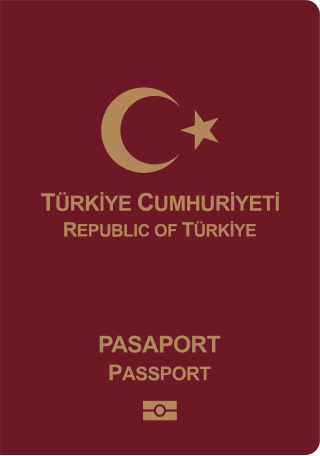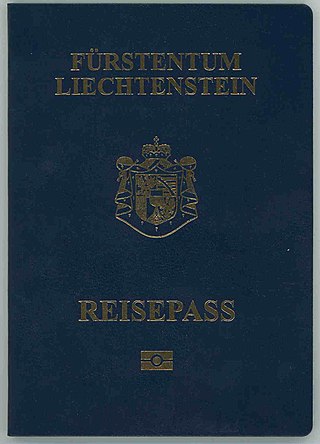
"State Sponsors of Terrorism" is a designation applied to countries that are alleged to have "repeatedly provided support for acts of international terrorism" per the United States Department of State. Inclusion on the list enables the United States government to impose four main types of unilateral sanctions: a restriction of foreign aid, a ban on weapons sales, heightened control over the export of dual-use equipment, and other miscellaneous economic sanctions. The State Department is required to maintain the list under section 1754(c) of the National Defense Authorization Act for Fiscal Year 2019, section 40 of the Arms Export Control Act, and section 620A of the Foreign Assistance Act.

A visa is a conditional authorization granted by a polity to a foreigner that allows them to enter, remain within, or leave its territory. Visas typically include limits on the duration of the foreigner's stay, areas within the country they may enter, the dates they may enter, the number of permitted visits, or if the individual can work in the country in question. Visas are associated with the request for permission to enter a territory and thus are, in most countries, distinct from actual formal permission for an alien to enter and remain in the country. In each instance, a visa is subject to entry permission by an immigration official at the time of actual entry and can be revoked at any time. Visa evidence most commonly takes the form of a sticker endorsed in the applicant's passport or other travel document but may also exist electronically. Some countries no longer issue physical visa evidence, instead recording details only in immigration databases.
The Visa Waiver Program (VWP) is a program of the United States federal government that allows nationals of specific countries to travel to the United States for tourism, business, or while in transit for up to 90 days without having to obtain a visa. It applies to all fifty U.S. states, the District of Columbia, Puerto Rico, and the U.S. Virgin Islands, as well as to Guam and the Northern Mariana Islands, which also have an additional program with waivers for more nationalities; American Samoa has a similar but separate program.

The Diversity Immigrant Visa program, also known as the green card lottery, is a United States government lottery program for receiving a United States Permanent Resident Card. The Immigration Act of 1990 established the current and permanent Diversity Visa (DV) program.
The USA PATRIOT Act was passed by the United States Congress in 2001 as a response to the September 11, 2001 attacks. It has ten titles, each containing numerous sections. Title IV: Protecting the Border aims to prevent terrorism in the USA through immigration regulations. The provisions of the title generally increase the difficulty of entering the country for those known to have, or suspected of having, terrorist intent.

Visitors to the United States must obtain a visa from one of the U.S. diplomatic missions unless they come from one of the visa-exempt or Visa Waiver Program countries. The same rules apply for travel to all U.S. states, Washington, D.C., Puerto Rico and the U.S. Virgin Islands, as well as to Guam and the Northern Mariana Islands with additional waivers, while similar but separate rules apply to American Samoa.
The Electronic System for Travel Authorization (ESTA) is an automated system that determines the eligibility of visitors to travel to the United States under the Visa Waiver Program (VWP). ESTA was mandated by the Implementing Recommendations of the 9/11 Commission Act of 2007. ESTA only authorizes travel to a U.S. airport, border or port of entry, but admissibility into the United States is determined by a U.S. Customs and Border Protection (CBP) officer upon arrival. The ESTA application collects biographic information and answers to VWP eligibility questions.

Turkish passports are issued in accordance with the Passport Act from 15 July 1950 to Turkish citizens to travel abroad. Citizens of the de facto state of the Turkish Republic of Northern Cyprus (TRNC) are also eligible to apply for a Turkish passport.

Egyptian passports are issued to nationals of Egypt for the purpose of international travel. Besides serving as a proof of Egyptian citizenship, they facilitate the process of securing assistance from Egyptian consular officials abroad if needed. Egyptian passports are valid for seven years for adults, and is issued for lesser periods for school or college students, or those who have not finalized their status of the military conscription. Starting in 2008, The Egyptian government introduced newer machine-readable passport (MRP), in order to comply with international passport standards and requirements with 96.7% conformance to ICAO Document 9303. The newer passports offer better security and state-of-the-art anti forging parameters and have a soft cover.

Visa requirements for Hungarian citizens are administrative entry restrictions imposed on citizens of Hungary by the authorities of other states.

Visa requirements for Emirati citizens are administrative entry restrictions by the authorities of other states placed on citizens of the United Arab Emirates (UAE).
Visa requirements for Costa Rican citizens are administrative entry restrictions by the authorities of other states placed on citizens of Costa Rica.
Visa requirements for Luxembourg citizens are administrative entry restrictions by the authorities of other states placed on citizens of Luxembourg. As of May 2023, Luxembourgish citizens had visa-free or visa on arrival access to 191 countries and territories, ranking the Luxembourg passport 4th in terms of travel freedom according to the Henley Passport Index. Additionally, the World Tourism Organization also published a report on 15 January 2016 ranking the Luxembourg passport 1st in the world in terms of travel freedom, with the mobility index of 160.

Under normal circumstances, visitors to Kuwait must obtain a visa unless they come from one of the visa exempt countries or countries eligible for visa on arrival/eVisa. All visitors must hold a passport valid for 6 months.

Visa requirements for Liechtenstein citizens are administrative entry restrictions by the authorities of other states placed on citizens of Liechtenstein. As of March 2023, Liechtenstein citizens had visa-free or visa on arrival access to 180 countries and territories, ranking the Liechtenstein passport 12th in terms of travel freedom overall, and the lowest of the EFTA member states, according to the Henley Passport Index.

United States–Israel Strategic Partnership Act of 2014 are almost identical bills introduced to the 113th United States Congress.
Automatic visa revalidation is one of a handful of exceptions to the general rule that a person who is not a United States citizen or lawful permanent resident can only lawfully enter the United States if he/she has a valid visa. According to automatic visa revalidation, people on some non-immigrant visa statuses who visit Canada, Mexico or some adjacent islands close to the United States for a period of less than 30 days can re-enter the United States based on a valid Form I-94 even if their visa has expired.

Executive Order 13769, titled Protecting the Nation from Foreign Terrorist Entry into the United States, labeled the "Muslim ban" by Donald Trump and his supporters and critics, and commonly known as such, or commonly referred to as the Trump travel ban, was an executive order by US President Donald Trump. Except for the extent to which it was blocked by various courts, it was in effect from January 27, 2017, until March 6, 2017, when it was superseded by Executive Order 13780, a second order sharing the title "Protecting the Nation from Foreign Terrorist Entry into the United States".

The Trump travel ban denotes a series of executive actions taken by Donald Trump as President of the United States, beginning with Protecting the Nation from Foreign Terrorist Entry into the United States.

Executive Order 13780, titled Protecting the Nation from Foreign Terrorist Entry into the United States, was an executive order signed by United States President Donald Trump on March 6, 2017. It placed a 90-day restriction on entry to the U.S. by nationals of Iran, Libya, Somalia, Sudan, Syria and Yemen, and barred entry for all refugees who did not possess either a visa or valid travel documents for 120 days. This executive order—sometimes called "Travel Ban 2.0"—revoked and replaced Executive Order 13769 issued on January 27, 2017.














